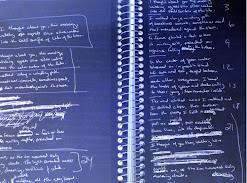
I hate being persnickety about details. I really do. But this article from Time Magazine has been sticking in my craw since I read it this weekend.
The stupid thing is that it is a good article. It's interesting and illuminates a big debate among poets and educators -- where does poetry belong, with the people or with the elite? See, it's about the Ruth Lily grant that the Poetry Foundation received. With this grant, the Poetry Foundation named John Barr, a poet and banker as the author painstakingly points out, as president. And now Barr is starting programs to help bring the poetry back to the people. All great news, in my book. As I often tell my students, if everyone read poetry, the world will be a better place.
So what's my problem? The author of the article, Lev Grossman, opens the article with several annoying and offensive stereotypes about poetry and poets. For instance...
1. "Money and poetry rarely have much to do with each other, especially in such a stunningly large quantity. Suddenly the small staff of Poetry was swimming in cash--it's the literary equivalent of the Beverly Hillbillies."
I can imagine the fish out of water TV sitcom now. The poet with flushing toilets and real writer neighbors.
2. "Poetry is the spinach in America's media diet: good for you, occasionally baked into other, tastier dishes (like the cameo that W.H. Auden's Funeral Blues made in Four Weddings and a Funeral) but rarely consumed on its own. In the hierarchy of cultural pursuits it sits somewhere just below classical music and just above clogging."
Seriously, clogging? In my informal and highly unscientific research, when you Google clogging, you get 4,890,000 hits. When you Google poetry, 145,000,000. And 108,000,000 for classical music, by the way.
3. "Poems became less like high-end pop songs and more like math problems to be solved. They turned into the property of snobs and professors."
I think we can aspire to being more than classy troubadours or bitter and troubled rock stars, while still retaining our level of intellectualism. In fact, I think it is more offensive to the public to say that because poetry became more intellectual, it became less popular. Surely, this is one of the reasons, but certainly not the only one.
So there's just a smattering of the things that bothered me. Taken out of context. I totally understood that this was exaggeration for emphasis because Mr. Grossman was making a point. I should take a breath and have a sense of humor. But, his language stings a bit, especially since he is contributing to the stereotypes that he is describing, by using this type of hyperbole.
Wednesday, June 13, 2007
Poets & Cloggers Unite!
Posted by Jessica at 7:30 PM
Labels: Politics and Writing, working writers, Writing Organizations
Subscribe to:
Post Comments (Atom)



0 Comments:
Post a Comment